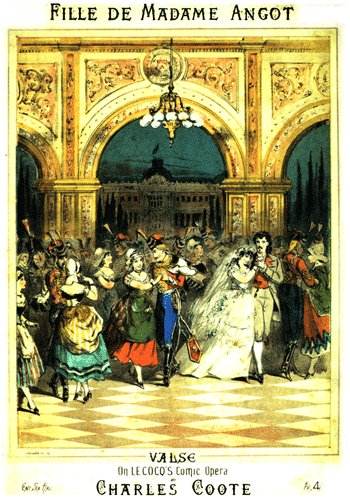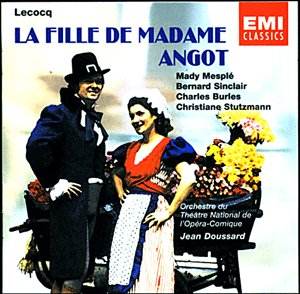Offenbach wrote his French operatic stage works on
a pattern begun by Auber in his Fra Diavalo, a comic opera with
dialogue. The new genre known as opéra comique is one that is
light, effervescent, bright and easily accessible. With a poor public
response to serious opera, Lecocq focused on opéra comique and
wrote around fifty stage works. Of them La Fille de Madam Angot
is the most famous and was well received in France. The new operatic
genre became popular in London from the late 1860s onwards. In Britain
this uniquely French style of opérette was eventually eclipsed
by the rise of the Savoy comic operas of Gilbert & Sullivan two
decades later.
Charles Lecocq was born of poor parents in Paris
in 1832 and as he grew up soaked up the ambience of Parisian theatre
life. He studied at the Conservatoire under Auber and was a contemporary
of Bizet and Saint-Saëns. He went on to share with Bizet the grand
prize in Offenbach’s operetta competition in 1856 for their compositions
of Le Docteur Miracle. In Madam Angot, Lecocq skilfully
weaves delightful melodies of more than one style. Although he set out
to steer clear of Offenbach’s style of composition the music we hear
is at times characteristic of Offenbach but his orchestrations are less
monotonous, more inventive and less course. The melodies and motifs
are quite moving and the music sweeps along – Lecocq was a first class
melodist. One can understand why the work was so successful and why
sheet music sales of dance arrangements sold so well.
Madam Angot, a story well known in France, is
a girl of the Market who is adopted and educated in a superior manner.
Rather than focus on the heavy-handed and coarse character of this person
Lecocq’s libretto concentrates on her unexpectedly charming daughter,
Clairette. Set at the time of the formidable French Directoire in the
1790s after the revolution the staging allows the use of the magnificent
costumes of the period to provide a visual spectacle (similar to that
achieved for My Fair Lady).
Remarkably there has been an absence of interest in
presenting a current production of this charming work despite an early
dual French/English edition being published by Boosey & Co. in their
Royal Edition. Traubner in his book suggests the overture is one of
the best written for a French operetta, and I wouldn’t disagree. From
the moment of the cheery Act 1 opening in Les Halles there is a run
of charming numbers: Pomponnet’s song "Aujourd’hui, prenons
bien garde" which indicates his forthcoming marriage; the striking
legend of Madam Angot "Marchande de marée";
Pitou’s reflective "Certainement, j’aimais Clairette";
and the memorable "Chanson politique". Act 2 is strong
and no less effective musically: an interesting pastiche of Verdi is
found in the choir of conspirators "Quand on conspire"
with a highlight found in the stirring waltz song "Tournez,
tournez". Act 3 contains a ballet and is memorable for its
Couplets "Vous aviez fait de la dépense", which
has an ‘Auber’, ring about it. The finale revisits the main songs and
builds them into an energetic climax.
The soloists both sing and act appropriately. (One
should not mix up this version with a very poor tape version, which
does not do justice to the operetta’s charm.) It helps to be able to
follow the French dialogue (though this is tracked separately so that
a CD player may be programmed to play the music alone). Mady Mesplé
(Clairette) needs no introduction to recordings of French opérette
with her distinctive, light and thinly textured soprano voice with rapid
vibrato. Bernard Sinclair (Ange Pitou) is less well known; he sings
in Pathé EMI’s companion production of Les Cloches de Corneville
in 1974. His energetic singing and agreeable tone matches the part well.
The choir are superb and provide a strong backing.
This 2 CD set is a reissue of LPs released in the 1973,
possibly as a centenary celebration of the work. The recording master
tapes have transferred well to CD and the resulting sound is excellent.
but the track indexing is inaccurate and seems as if it has been done
‘on line’, since an end note of a previous track is often heard. With
this mid-price issue, no notes are included.
Raymond Walker
Further reading: "Operetta", Traubner (Oxford);
‘Musicals", Ganzl (Carlton)
Production poster (1872)


![]() Mady Mesplé (Clairette),
Bernard Sinclair (Ange Pitou), Charles Burles (Pomponnet), Christiane
Stutzmann (Mademoiselle Lange) Denise Benoit, Michel Roux, Jacques Loreau,
Gerard Chapuis
Mady Mesplé (Clairette),
Bernard Sinclair (Ange Pitou), Charles Burles (Pomponnet), Christiane
Stutzmann (Mademoiselle Lange) Denise Benoit, Michel Roux, Jacques Loreau,
Gerard Chapuis ![]() EMI 72435 7408228 [CD1
60.17 CD2 58.21]
EMI 72435 7408228 [CD1
60.17 CD2 58.21]
